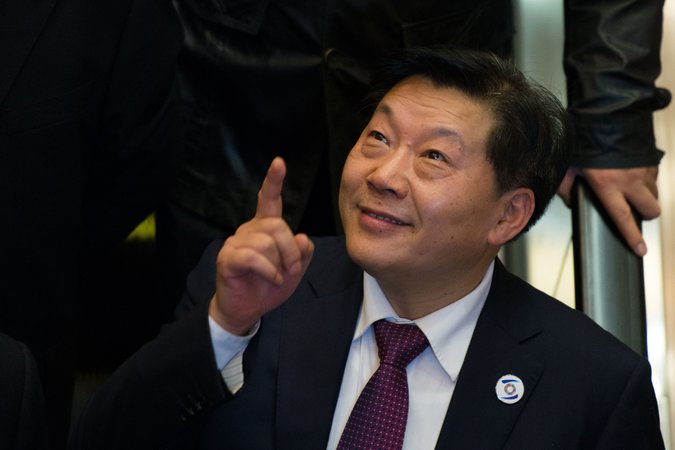State news agency Xinhua reported on Tuesday that former "Cyberczar" and senior propaganda official Lu Wei has been sentenced to 14 years in prison for accepting bribes:
Lu Wei, former deputy head of the Publicity Department of the Communist Party of China (CPC) Central Committee, was handed a 14-year jail term plus a fine of 3 million yuan (about 450,000 U.S. dollars) for taking bribes, the Ningbo Municipal Intermediate People’s Court ruled on Tuesday.
[…] Lu was found to have taken advantage of his positions to help certain organizations and personnel with internet management, running enterprises, personal promotions and job transfers between 2002 and 2017, according to the court. He had directly or through others accepted or solicited money and property worth 32 million yuan from the above-mentioned organizations and personnel, the court said. [Source]
The Wall Street Journal’s Eva Dou described the sentencing’s context and significance:
The sentencing Tuesday of Mr. Lu brings to a close a high-profile corruption case that has been intently watched in part because Mr. Lu was closely associated with China’s strict policing of the internet. As head of China’s Cyberspace Administration, he was often by turns friendly but uncompromising in his dealings with Western companies like Facebook Inc. and Apple Inc.
[…] The sentence roughly accords with those given to other officials of similar rank caught in President Xi Jinping’s crackdown on graft. Still, experts on China’s media and politics said Mr. Lu’s case is notable because it shows the difficulties President Xi has had commanding loyalty among top Communist Party propagandists.
“I think we can see the Lu Wei case as a tantalizing glimpse at endemic corruption within the whole system of media control in China,” said David Bandurski, at the University of Hong Kong’s China Media Project. A powerful agency like the Cyberspace Administration, with its control over internet media, combined with the government’s lack of transparency, make “a recipe for corruption,” he said. “You would have to be very naive to see Lu Wei as an isolated example.“ [Source]
Xinhua’s report, like others in official media after his indictment last August, focused on his propaganda role rather than his earlier position as the founding head of the Cyberspace Administration of China, founded in 2013 as "an important pillar of China’s IT-backed authoritarianism." In that capacity, Lu became an outspoken champion of digital controls, insisting that "the internet must have brakes" and that China has the right to "choose who can come to our home and be our guest"; expounding four rules for being a "good Chinese netizen"; mingling with foreign tech executives like Facebook’s Mark Zuckerberg; and promoting the concept of internet sovereignty.
He was suddenly removed from his CAC post in June 2016, however, and confirmed to be under investigation for "serious violations of discipline" in November the following year. A propaganda directive issued at the time ordered the closure of "comments on websites, Wechat public accounts, Weibo etc. Find and delete negative comments attacking the system, and so on." Official announcements of both Lu’s criminal indictment and sentencing were considerably more muted than the tirade against him issued by the Party’s Central Commission for Discipline Inspection when it stripped him of his Party membership and referred his case for criminal prosecution in February last year. From CDT’s translation:
The investigation showed that Lu Wei had seriously violated political discipline and norms; deceived central authorities with overt agreement but covert opposition; ignored established practice and behaved unscrupulously; improperly discussed central policy; obstructed central authorities’ investigations; allowed his personal ambitions to run wild; made personal use of government property; engaged in self-promotion by any available means, and in atrocious moral conduct including anonymous false accusations against others; engaged in factional recruitment, setting up a "clique." He had seriously violated mass discipline and the spirit of the central authorities’ eight-point austerity rules, frequenting private clubs, vigorously pursuing privilege, and acting crudely, arrogantly, and domineeringly. He violated organizational discipline, giving inaccurate accounts both in speech and in writing; he violated anti-corruption discipline, abusing his power for personal gain and enrichment; he violated work discipline, selectively implementing the center’s strategic plan for internet management; and he used power to obtain sex without a shred of integrity. He exploited his post for others’ benefit and is suspected of accepting huge bribes.
As a senior Party cadre, Lu Wei’s ideological conviction was deficient, he completely lacked Party spirit and principles, he was extremely disloyal to the Party’s Central Committee, he lacked every one of the "Four Consciousnesses" and violated each of the "Six Great Disciplines," and was a typical “two-faced person,” showing no restraint or awareness of when to stop after the 18th Party Congress. This concentration of serious issues outraged the masses, and offers a textbook case of mutually entangled political and economic problems, extremely low character, and grave specifics. […] [Source]
In his report on the sentencing at South China Morning Post, William Zheng highlighted another account of Lu’s misdeeds that emerged last year:
Last November, a handwritten letter of repentance from Lu went on display at an exhibition in Beijing to mark the 40th anniversary of the country’s reform and opening up.
“I have made serious, unforgivable mistakes in politics, finance, work, and life, and totally abandoned the basic principles and the bottom line of a Communist Party member,” Lu wrote.
In an apparent reference to the party’s claims that he traded power for sex, Lu wrote: “My lifestyle hurt my wife deeply and we often argued because of it.
“She has completely given up on me. She once said to me in sadness: ‘I can’t control you, but sooner or later the Communist Party will fix you.’ And the prophecy has come true!” [Source]








